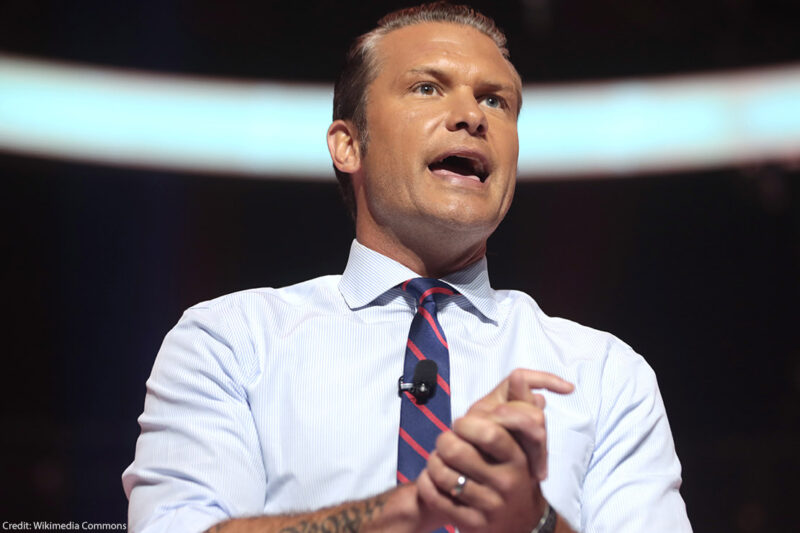Where Defense Secretary Nominee Pete Hegseth Stands on Civil Liberties


President-elect Donald Trump has nominated the Fox News Channel host Pete Hegseth to lead the Department of Defense (DOD). If confirmed, the military veteran will lead the nation’s armed forces in what will be his first appointment to a political office.
Hegseth was commissioned as an infantry officer in the Army National Guard and he served in Afghanistan and Iraq after 9/11. Prior to his stint as a talk show host on Fox News, he led the nonprofits Vets for Freedom and Concerned Veterans for America.
The ACLU has spent more than 100 years holding power accountable. While as a matter of policy the ACLU does not endorse or oppose nominees for cabinet-level positions, it does examine and publicize nominees’ civil liberties records. Given the power and influence defense officials have over U.S. national security policy and decision making, a president’s secretary of defense choice has serious consequences for civil liberties at home and abroad. Ahead of the January Senate confirmation hearings, we analyze Hegseth’s record on key civil liberties issues, and urge Congress to carefully consider the impact his leadership would have on our rights.
The Department of Defense on Civil Liberties
As the largest U.S. government agency with the largest discretionary budget, the DOD oversees all U.S. military operations. The secretary of defense is responsible for ensuring troops comply with all applicable laws, including the laws of war. Importantly, the secretary must comply with both the Constitution, which requires Congress alone to make the ultimate decision to go to war and use force except to repel a sudden attack (and then only for a limited period); and the War Powers Resolution, which Congress intended to reflect the Constitution’s checks and balances. The Constitution itself gives the power to declare war and authorize the use of force to Congress alone. The ACLU has long advocated against unlawful use of force abroad, as well as adherence to our system of checks and balances and international humanitarian and human rights law.
With blatant disregard for the appropriate role of the military on American soil, Trump has, on numerous occasions, stated that he plans to use military troops Deployment of troops for these purposes would be an abuse of power. As secretary of defense, Hegseth could be called upon to support or carry out these extreme and unprecedented actions.

Immigrants' Rights
National Security
Samma v. U.S. Department of Defense—Lawsuit Challenging Policy Denying U.S. Military Service Members Expedited Path to Citizenship

Immigrants' Rights
National Security
Samma v. U.S. Department of Defense—Lawsuit Challenging Policy Denying U.S. Military Service Members Expedited Path to Citizenship
The DOD is the largest employer in the U.S., with nearly 1 million civilian employees and more than 2 million military personnel. Whether it’s protecting the rights of LGBTQ servicemembers and their families, ensuring that immigrant service members are given the expedited citizenship they may be entitled to, or demanding that parents be allowed to enroll and graduate from military service academies, it is vital for the DOD to protect the civil rights and liberties of its employees and comply with the rule of law in serving the American people writ large.
On the Record: Where Hegseth Stands
Hegseth has a long record of extremely concerning views on a variety of civil liberties issues related to the military and U.S. national security policy. His positions include:
- He has excused war crimes. Disregarding the objections of senior defense officials, he Trump to pardon three U.S. servicemen accused, or convicted, of war crimes. Trump ultimately pardoned all three men.
- He has supported overbroad claims of presidential authority to use lethal force without congressional authorization. He not only supported the Trump administration’s lethal strike against Qassem Soleimani, leader of Iran's Islamic Revolutionary Guard Corps-Qods Force, he also pushed for Trump to bomb cultural sites in Iran, which would have contravened the laws of war. Hegseth has also that the U.S. use the military against Mexico’s drug cartels.
- He has supported using the military to suppress protests. In 2020, he sending the military to U.S. cities, like Seattle, to suppress racial justice protests.
- He has opposed efforts to fight discrimination in the military. Hegseth has that, “any general that was involved, general, admiral, whatever, that was involved in any of the DEI, woke s--t has got to go.” In reference to the current chairman of the Joint Chiefs of Staff, who is Black, Hegseth , “Take it to the racist bank: black troops, at all levels, will be promoted simply based on their race. Some will be qualified; some will not be.”
- He recently shifted his views on women serving in combat. In November, he said he opposed women in combat, and used gender stereotypes to make his case. He , “I’m straight up just saying we should not have women in combat roles. It hasn’t made us more effective. Hasn’t made us more lethal. Has made fighting more complicated.” But after meeting with several women senators in December, he “we support all women in our military today, . . . combat included.”
- Hegseth has also opposed medical care for transgender soldiers. He stated that transgender soldiers are “” because they are “reliant on chemicals” and referred to discussions on transgender issues in the military as “”
- He has made virulently anti-Muslim statements. He that Muslim communities in America represent “an existential threat” to the country and repeated other vitriolic and hateful stereotypes about Muslims, who already face discrimination in the U.S., especially by national security agencies.
Finally, exist that Hegseth has engaged in sexual misconduct, and the Senate must investigate the matter further before advancing his nomination. Given longstanding concerns regarding sexual assault in the military and the statements Hegseth has made regarding the role of women in combat, these allegations are directly relevant to his nomination as secretary of defense.
Commitments the ACLU is Urging Senators to Demand at Hegseth’s Confirmation Hearing:
Based on his track record, the ACLU is concerned about how Hegseth would use the DOD’s vast power and resources, and about the impact his leadership would have on our civil liberties and civil rights. At his confirmation hearing, we’re urging senators to ask Hegseth:
- When the framers drafted the Constitution, they wanted to ensure the clear separation of the civilian government from a nonpolitical, nonpartisan military. The military should have no role to play in mass deportation or suppression of protest and in fact we condemn other countries that send in troops to break up protests or enforce civil laws. Will you pledge not to deploy the military to intimidate or use force against protesters in American cities? Will you pledge not to deploy troops to carry out civilian law enforcement functions on American soil, which could place them at risk of violating criminal law?
- In 2015, 78 Senators voted to ensure that this country never again engages in torture. Do you agree to support and adhere to that bipartisan pledge?
- Adherence to the rule of law, including the laws of war, is critical for U.S. service members who rely on the secretary of defense to ensure they are not placed at risk of committing unlawful actions. Will you ensure that the DOD conforms to the checks and balances enshrined in the Constitution and act only as authorized by Congress, as well as international humanitarian law?
- Will you support LGBTQ service members continuing to serve in the military, and also provide health care, including reproductive health care and gender-affirming care, for all eligible service members and their families?
- In the space of less than two months, you went from arguing, ““I’m straight up just saying we should not have women in combat roles,” to later saying, “we support all women in our military today, . . . combat included.” Will you commit now to continue all of the Department’s current policies and practices that support women serving in combat and in combat positions?

Help Shape the Confirmation Hearings: Your Questions for Key Nominees | American Civil Liberties Union


